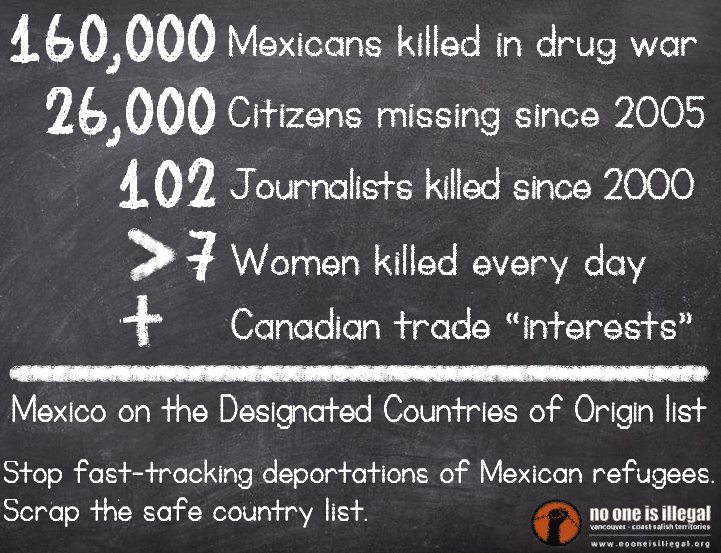On Dec. 18, International Migrants Day, the Vancouver chapter of No One Is Illegal (NOII) demanded the federal government remove Mexico from its list of Designated Countries of Origin used to determine refugee status.
When the Conservatives passed Bill C-31, otherwise known Protecting Canada’s Immigration System Act, NOII and the Canadian Council for Refugees (CCR) were quick to point out the bill’s deficiencies, most notably hasty timelines and fewer rights for applicants who are from Designated Countries of Origin.
“Claimants from these countries will be subject to to an even more expedited claim process that denies them a reasonable opportunity to prove their refugee claims,” reads a statement from CCR. “Claimants from designated countries of origin will also be deprived of basic and emergency health care.”
Currently, NOII has created a petition to remove Mexico from the list of Designated Countries of Origin. It has collected over 1,200 signatures, according to an official press release.
The petition was done partly as a response to a Mexican migrant who committed suicide while being held in Canadian detention centre, the release reported. The request to have Mexico removed from the Designated Countries of Origin List also comes in light of recent events surrounding 43 missing students in Ayotzinapa.
“The Canadian government considers Mexico, its North American Free Trade Agreement partner, a safe country for Mexican refugees,” said Mexican refugee and journalist Karla Lottini. “But in a glaring example of hypocrisy, the Canadian government frequently advises its own citizens to not travel to parts of Mexico.”
This past November, Travel Canada issued an advisory for Mexico, warning potential travellers to “exercise a high degree of caution” as “high levels of criminal activity, as well as occasional illegal roadblocks, demonstrations and protest remain a concern throughout the country.”
Bill C-31 isn’t the only piece of legislation harming Mexicans who wish to come to Canada. Bill C-24, the act to amend the Citizenship Act, has made it harder for Mexican people to apply for citizenship or even permanent resident status despite the situation in Mexico.
Around 70 per cent of municipalities are infiltrated by drug cartels while the War on Drugs has claimed around 80,000 victims.
“Everywhere else, we would call that a civil war,” said NDP MP Pierre Dionne Labelle in Parliament in June 2014. “But when it comes to a country with which we have an agreement called NAFTA, we cannot start talking about civil war and calling that country dangerous.”
Francella Fiallos is a fourth year journalism student at Carleton University in Ottawa. She sits on the Board of Directors for OPIRG-Carleton, edits a campus newspaper, and hosts a radio show on CKCU 93.1 FM in the capital region. In her spare time, she enjoys rock climbing and kayaking.




